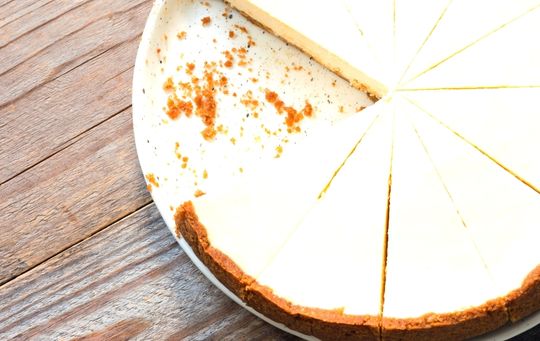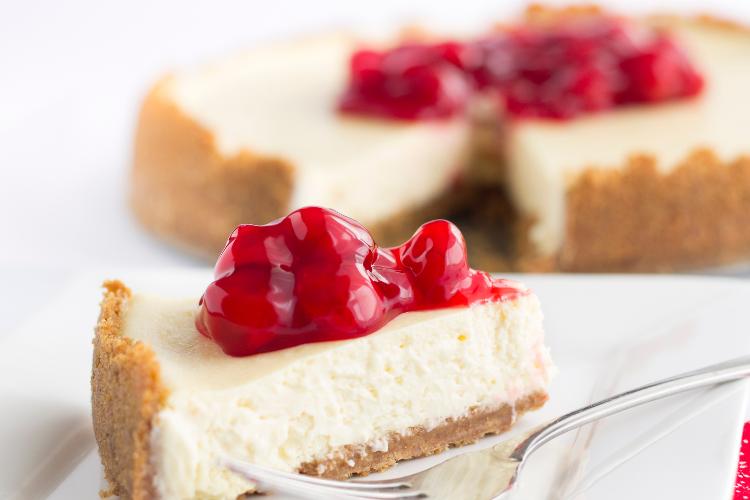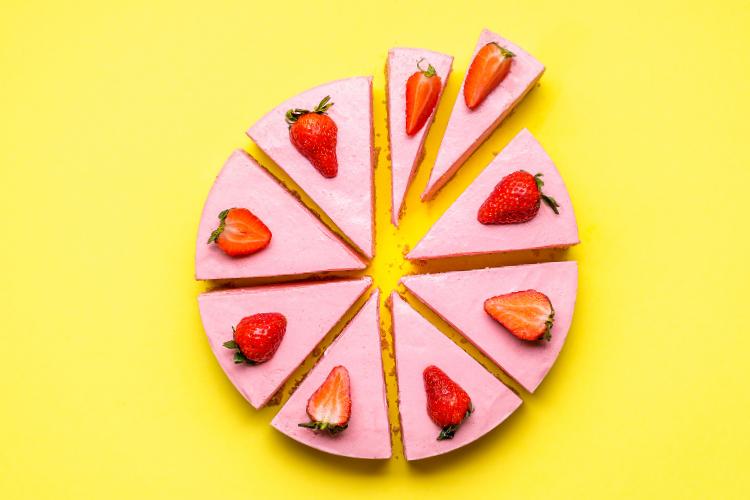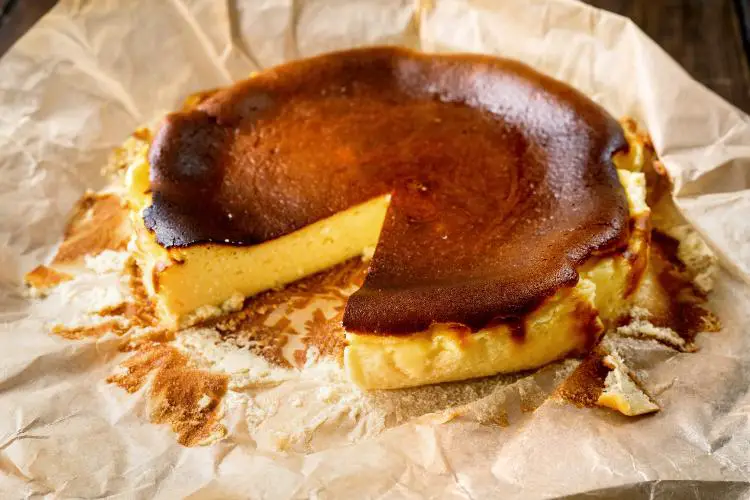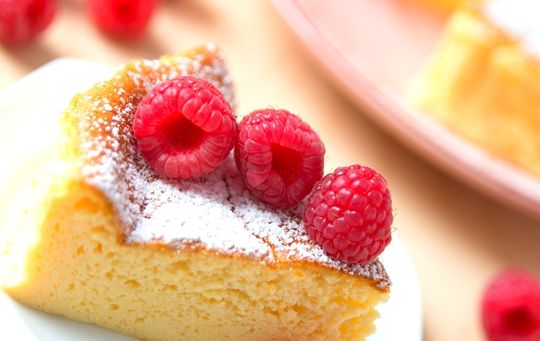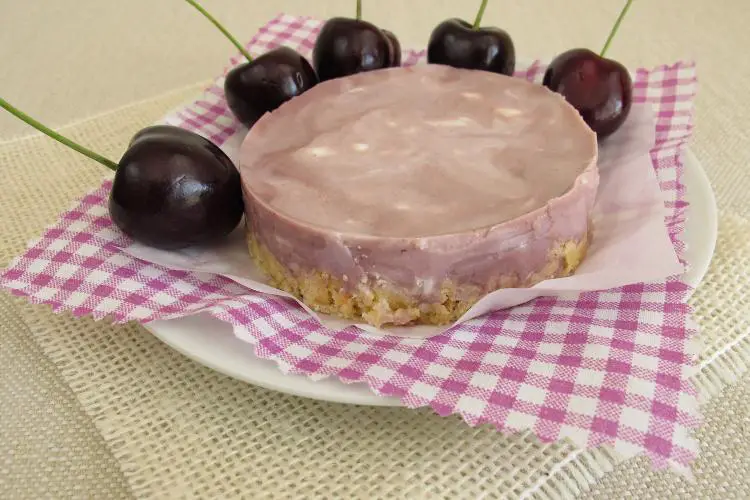Baked cheesecakes are a beloved dessert that often feature a creamy, smooth filling atop a biscuit or cookie crust. However, despite their creamy consistency and attractive appearance, baked cheesecakes are prone to cracking during the baking process.
Why do baked cheesecakes crack? Baked cheesecakes can crack due to factors like overbaking, sudden temperature changes, overmixing, inadequate cooling, and a lack of moisture. These issues can result in the cheesecake’s surface contracting and splitting as it cools, causing cracks.
5 Reasons Why Do Baked Cheesecakes Crack
| Reason | Explanation |
|---|---|
| Overbaking | Baking cheesecake for too long or at too high a temperature can cause it to dry out and crack as it cools. |
| Sudden Temperature Change | Rapid temperature shifts, such as removing the hot cheesecake from the oven to a cool environment, can lead to cracks. |
| Overmixing | Excessive mixing or incorporating too much air into the batter can result in cracks during baking and cooling. |
| Inadequate Cooling | Cheesecakes need to cool gradually; a rapid shift from oven to the refrigerator can cause cracks. |
| Lack of Moisture | Insufficient moisture in the oven, like using a water bath, can lead to cracking due to the cheesecake drying out. |
Understanding these factors and taking preventive measures can help reduce the chances of your baked cheesecake developing unsightly cracks.
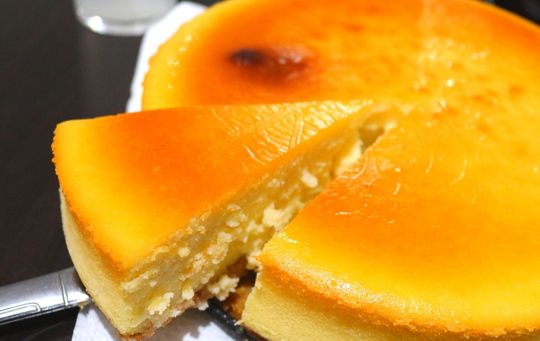
Why do baked cheesecakes crack?
Several factors can cause baked cheesecakes to crack, including:
Overbaking: When the cheesecake is overbaked, the surface gets too dry and cracks.
Rapid cooling: Rapid temperature changes might cause the cheesecake to break as it cools.
Air bubbles: Incorrect mixing or too much air in the batter can result in the formation of air bubbles, which can burst and produce cracks when the cheesecake bakes.
Improper ingredients: Using too heated ingredients or adding too much sugar will cause the cheesecake to crack.
Poor baking technique: Cracking can occur when the cheesecake is baked at the incorrect temperature or without using a water bath.
Overmixing The Ingredients
One of the primary causes of cheesecake cracks is overmixing the ingredients. When the batter is mixed too much, it can cause excess air to be incorporated into the mixture.
This air can cause the cheesecake to rise too quickly during the baking process, leading to cracks on the surface.
To avoid overmixing, it is important to follow the recipe instructions carefully and mix the ingredients just until they are fully combined.
Rapid Temperature Changes
Another common reason for cheesecake cracks is rapid temperature changes.
When a cheesecake is taken from the oven and immediately placed in a cold environment, the sudden change in temperature can cause the cheesecake to crack.
To prevent this from happening, it is important to allow the cheesecake to cool slowly by leaving it in the oven with the door slightly ajar or by placing it on a wire rack to cool to room temperature before refrigerating.
Incorrect Oven Temperature
Baked cheesecakes require a precise oven temperature in order to bake evenly and avoid cracks.
If the oven is too hot, the cheesecake may cook too quickly and cause the surface to crack. On the other hand, if the oven is too cool, the cheesecake may not cook evenly and may also develop cracks.
It is important to use an oven thermometer to ensure that the oven temperature is correct and to adjust the temperature as needed.

Insufficient Baking Time
Another factor that can contribute to cheesecake cracks is insufficient baking time. If the cheesecake is undercooked, the center may not have had enough time to set properly, leading to cracks on the surface.
To avoid this, it is important to follow the recipe instructions carefully and to use a toothpick or cake tester to ensure that the cheesecake is fully baked before removing it from the oven.
Removing The Cheesecake From The Pan Too Soon
Finally, another common cause of cheesecake cracks is removing the cheesecake from the pan too soon.
Cheesecakes need to be fully cooled and set before they can be removed from the pan without risking cracks.
To avoid this, it is important to allow the cheesecake to cool completely in the pan before attempting to remove it.
Conclusion
In conclusion, there are several reasons why baked cheesecakes may crack during the baking process.
By understanding these causes and taking the necessary precautions, it is possible to avoid cheesecake cracks and enjoy a smooth and creamy dessert.
By mixing the ingredients carefully, avoiding rapid temperature changes, ensuring that the oven temperature is correct, allowing sufficient baking time, and allowing the cheesecake to cool completely before removing it from the pan, it is possible to bake a perfect cheesecake every time.
Frequently Asked Questions
Do Cheesecakes Rise?
No, cheesecakes typically do not rise like traditional cakes.
Why Do Cheesecakes Crack?
Cheesecakes can crack due to overbaking, rapid temperature changes, or excessive mixing, causing air bubbles.
Why Did My Cheesecake Crack?
Your cheesecake may have cracked due to overbaking, sudden temperature shifts, or improper mixing.
Cracked Cheesecake?
A cracked cheesecake can result from various factors like overbaking or insufficient cooling.
Why Does Cheesecake Crack?
Cheesecakes often crack due to overbaking or sudden temperature changes during baking or cooling.
Cheesecake Cracked?
A cracked cheesecake can occur due to overbaking, insufficient cooling, or uneven mixing.
How to Prevent Cracks in Cheesecake?
To prevent cracks in cheesecake, use a water bath, avoid overbaking, and let it cool slowly in the turned-off oven.
Cheesecake Cracking?
Cheesecake cracking is common when it’s subjected to temperature fluctuations or overcooked.
Why Did My Baked Cheesecake Crack?
Your baked cheesecake may have cracked due to overbaking, rapid cooling, or uneven mixing.
Cracks in Cheesecake?
Cracks in cheesecake are often caused by overbaking or sudden temperature changes.
What Causes Cheesecake to Crack?
Cheesecake cracks can be caused by overcooking, insufficient cooling, or drastic temperature changes.
Why Cheesecake Cracks?
Cheesecake can crack due to overbaking or cooling too quickly, creating stress on the surface.
Why Is My Cheesecake Cracking?
Your cheesecake may be cracking due to overbaking or cooling it too rapidly.
Why Did Cheesecake Crack?
A cheesecake can crack because of factors like overbaking or not allowing it to cool properly.
Why Does My Cheesecake Crack?
Cheesecake cracking can occur if it’s overcooked or experiences sudden temperature changes.
How to Prevent Cheesecake from Cracking?
Prevent cheesecake from cracking by using a water bath, not overbaking, and allowing gradual cooling.
What Causes a Cheesecake to Crack?
A cheesecake can crack due to overbaking, uneven mixing, or abrupt temperature changes.
Crack in Cheesecake?
A crack in a cheesecake’s surface is often caused by baking or cooling issues.
How to Prevent a Cheesecake from Cracking?
To prevent cheesecake from cracking, use a water bath, bake it at a lower temperature, and cool it gradually.
My Cheesecake Cracked?
If your cheesecake cracked, it’s likely due to overbaking or cooling too quickly.
Overbaked Cheesecake?
An overbaked cheesecake can result in cracking, so it’s essential to monitor baking time carefully.
What Makes Cheesecake Crack?
Factors like overbaking or abrupt temperature changes can make a cheesecake crack.
Why My Cheesecake Cracked?
Your cheesecake may have cracked due to overbaking or sudden temperature fluctuations during baking.
What Makes a Cheesecake Crack?
A cheesecake can crack when exposed to excessive heat or rapid temperature changes.
Why Did My Cheesecake Crack While Cooling?
Cheesecake can crack while cooling if it cools too quickly; a gradual cooling process helps prevent this.
Why Does a Cheesecake Crack?
Cheesecake may crack due to rapid temperature shifts or overbaking during the baking process.
Cheesecake Cracked While Cooling?
Cheesecake can crack during cooling if not allowed to cool gradually; sudden temperature changes can cause cracks.
How to Avoid Cracks in Cheesecake?
To avoid cracks in cheesecake, bake it in a water bath, don’t overcook, and let it cool slowly in the oven.
Why Cheesecake Crack?
Cheesecake may crack due to factors like overbaking or cooling it too quickly after baking.
Why Did My Cheesecake Rise?
Cheesecakes typically don’t rise like traditional cakes because they lack leavening agents.
Cheesecake Cracking While Baking?
Cheesecake can crack while baking due to uneven baking, overmixing, or excessive oven temperature.
Crack Cheesecake?
A cracked cheesecake can occur if it’s overcooked, overmixed, or exposed to temperature fluctuations.
Why Did My Cheesecake Crack in the Middle?
A cheesecake may crack in the middle due to uneven baking, overmixing, or rapid temperature changes during baking.
Why Did My Cheesecake Crack While Baking?
Cheesecake can crack during baking if it’s overcooked or not baked with proper precautions.
Why Did My Cheesecake Split?
A cheesecake may split if it’s overbaked or subjected to abrupt temperature changes.
Why Does Baked Cheesecake Crack?
Baked cheesecake can crack due to overbaking, cooling too quickly, or mixing issues.
Why Does Cheesecake Crack After Baking?
Cheesecake may crack after baking if it’s not cooled gradually or if there are temperature fluctuations.

